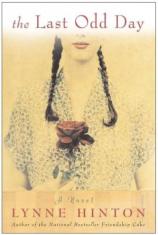The Last Odd Day
Review
The Last Odd Day
Fans of Lynne Hinton's previous novels will find her new book, THE LAST ODD DAY, odd indeed. Deriving its title from November 19, 1999 (11.19.1999), the "last odd day" until 3111, it is a quiet, rambling account of an older blue-collar woman coping with her husband's long-term care and her own long-term memories; it is more novella than novel and more a meditation than a narrative. However, while Jean Clover's story may not have the dramatic action or symbolic cohesion of Hinton's earlier work, it is nonetheless a lovely story replete with messages of faith, hope and charity.
The basic facts: Jean, daughter of a Cherokee woman and a blind white man, grows up poor and marries O.T., who almost immediately goes off to fight in World War II, leaving Jean home on the farm with his parents and brother. For many years, nothing much happens: O.T. works, Jean keeps house, and any disappointments either of them feel are either ignored or accepted --- until the day Jean learns that the child she has carried nearly to term has died in utero. After the grueling and gruesome experience of laboring in childbirth without a baby to take home, Jean runs away to a motel for a month, filling her room with infant clothes, toys, and paraphernalia until returning home quietly and carrying on as if nothing had happened.
The years pass, and the couple carry on as if nothing ever will happen --- until the day when O.T. is felled by a stroke and winds up in a nursing home at half his former size and with less than half of his former faculties. Jean visits and cares for him faithfully, and during one of her regular bedside stays, she learns from a caregiver that her husband has had another visitor. Jean's encounter with that person will change both of their lives.
It's not spoiling this book to reveal that O.T. had secrets; it would be spoiling the book, however, to give all of the details of what Jean does with her new knowledge. What is most fascinating about Jean's reminiscences is that, despite the lack of luxuries in her life, she lacks neither love nor wisdom. When, at the end, her conventional church-lady neighbor attempts to tie up Jean's life, Jean resists with her customary stillness, knowing that some events and emotions cannot be reduced.
Hinton's achievement in THE LAST ODD DAY is a protagonist who will not be reduced, even if her circumstances and choices have made her a woman of little consequence for many people. Jean's dignity and decency are not contrived; Hinton seems almost to have channeled this character from a deep place, from the Godhead. But while Jean is a compelling character, the reader simply doesn't have enough information about her to understand her actions. Even at 192 pages, the book feels more like a character sketch than a narrative; yet such a moving and sincere character sketch should not be ignored.
Reviewed by Bethanne Kelly Patrick on May 25, 2004




